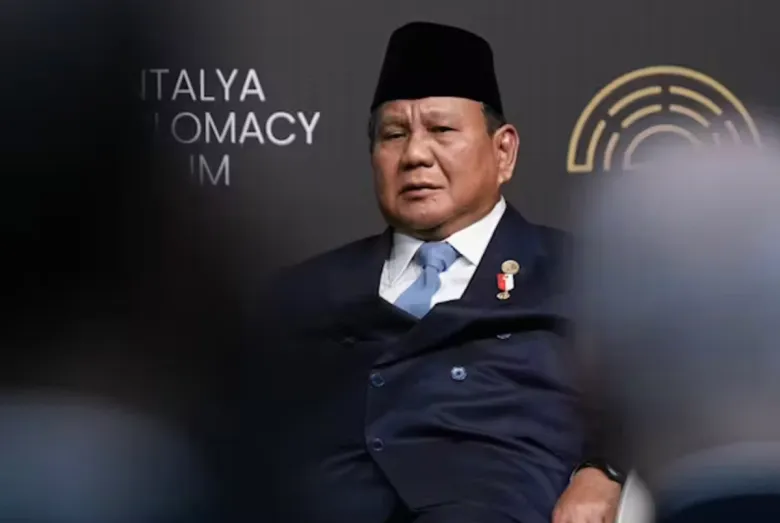Indonesia averts Trump’s 32% tariff threat but new 19% tax will test Prabowo’s strategic balancing act at home and abroad.

Indonesian President Prabowo Subianto is feeling the squeeze of Donald Trump’s tariffs. (Photo: X Screengrab)
JAKARTA – On July 15, Indonesia and the United States reached a compromise: the threatened 32% tariff on Indonesian exports will now be capped at 19% in exchange for Indonesia’s commitment to purchase US energy, agricultural goods, and 50 Boeing aircraft.
The deal also reportedly includes reciprocal tariff relief for American exports to Indonesia. The announcement, however, came unilaterally via a post on President Trump’s Truth Social platform. While Jakarta’s stock market reacted positively, no official statement has been issued from President Prabowo Subianto’s office at the time of writing.
Key aspects of the agreement—particularly its implementation timeline and enforcement mechanisms—remain uncertain. What is clear, however, is that the energy, agriculture and Boeing components of the deal had been proactively offered by Indonesia in prior negotiations, as reported by CNBC Indonesia and The Jakarta Post, further underscoring Jakarta’s strategic signaling even before Trump announced it on social media.
This asymmetrical rollout underscores the transactional nature of Trump-era trade tactics and places Indonesia in a diplomatically delicate position – forced to respond without the benefit of reciprocal clarity.
The 19% tariff rate, though less severe than Trump’s original 32% threat, offers limited relief. It reflects a partial de-escalation in a high-pressure game where leverage and optics trump deliberative fairness.
Indonesia’s inclusion—alongside China, Japan, Brazil, the EU and dozens of other countries—had little to do with specific trade violations. Rather, it reflects Washington’s myopic vision of its global economic relationships: maximizing short-term partisan gain at the expense of systemic stability.
This episode is more than bilateral maneuvering; it constitutes a strategic test for Indonesia. The real question is whether the Prabowo government can craft a resilient, adaptive response under asymmetric pressure, one that reinforces—not compromises—Indonesia’s long-term strategic and economic sovereignty.
Some observers have argued the deal is a clear-cut diplomatic failure. A recent Australian Outlook article by CELIOS, published before the July 15 announcement, called for a cabinet reshuffle, pointing to disjointed communication and technocratic underperformance.
But while the critique identifies real symptoms—such as confusion over negotiating mandates and a long-vacant ambassadorial post—it mistakes short-term optics for attempts to forge a long-term strategic structure.
Indeed, President Prabowo moved early on this front. Since taking office last October, he has pursued a multi-vector foreign policy aimed at expanding Indonesia’s geopolitical and economic options.
He has met with counterparts from China, Europe, Japan, Russia, India, Australia, Brazil and the Middle East. Indonesia joined its first BRICS summit, revived trade talks with the EU, initiated outreach to Latin America, and reinforced bilateral ties with key Muslim brother Saudi Arabia.
Symbolically, Prabowo’s recent appearances alongside leaders like French President Emmanuel Macron at Bastille Day and Turkish President Recep Tayyip Erdogan in Ankara—where 11 billion euros worth of deals and 13 cooperation agreements, respectively, were signed—illustrate Indonesia’s active hedging against global economic fragmentation and potential strategic shifts.
These bilateral engagements also included defense cooperation, reflecting Indonesia’s intent to link economic strategy with broader security considerations.
But diplomacy alone cannot buffer the economy. Prabowo has also directed key domestic institutions to coordinate policy delivery. His administration has activated task forces focused on US trade response, deregulation, and labor market adjustment. Bank Indonesia, recognizing the urgency while maintaining its independence, has adjusted its monetary stance to preserve rupiah stability amid market volatility.
Meanwhile, the Danantara fund—Indonesia’s new sovereign wealth and development vehicle—has been structured to enhance national capacity to finance green energy, critical infrastructure and food system resilience.
Critiques like CELIOS’ overstate the effectiveness of short-term governance fixes, like cabinet reshuffles, and understate the structural reality of negotiating with a major power that shifts its trade doctrine by tweet. A personnel shake-up will not change the terms of asymmetry.
What Indonesia requires is institutional stamina and adaptive coordination. Indeed, Prabowo’s recent nomination of Indroyono Soesilo as ambassador to Washington reflects a course correction grounded in practical diplomacy, not theatrical reset.
As an ABC analysis noted, the Trump tariff doctrine has ripple effects that are felt most acutely in emerging markets. While the immediate cost will fall on US consumers in many sectors, the structural burden of supply chain adjustment, risk repricing and investor perception falls heavily on countries like Indonesia.
Jakarta’s ability to weather these headwinds will depend less on any single deal, and more on whether its broader strategy builds economic depth. In that light, the July 15 announcement—while a tactical step forward in terms of avoiding a harsher tariff—is no guarantee of future reprieve. It reflects a pause, not a pivot. It buys Indonesia time, but not immunity.
The weeks ahead must now focus on consolidation: fast-tracking alternative trade routes, deepening ties with ASEAN and the Global South, and insulating Indonesia’s critical industries from further external shocks. At the same time, the government must show clarity in its communication, especially toward investors and producers navigating this new landscape.
Toward its domestic constituents, the government will also need to manage rising expectations and potential discontent, particularly among export-oriented industries, small producers, workers and consumers who may feel squeezed by the reverberation from this global trade disruption.
Prabowo will have to maintain a careful balance—communicating that while this deal secures temporary relief, it does not resolve the structural challenges ahead. Managing perceptions, sustaining investor confidence and ensuring that trade-offs do not disproportionately burden lower-income Indonesians will be critical to his government’s future political stability.
For all its constraints, Indonesia retains agency. It boasts a large domestic market, growing regional influence and leadership that is attempting to navigate an increasingly fluid global order. The strategic direction appears promising, but whether it will yield a net positive outcome remains to be seen. At least, for the time being, Indonesia can avert Sauron’s gaze.*
Adi Abidin is a public policy specialist at the Kiroyan Partners and a research fellow at Populi Center, both of which are Jakarta-based offices. The views expressed here are his own.
Source: Asia Times, July 16, 2025.
Download the clipping here.



